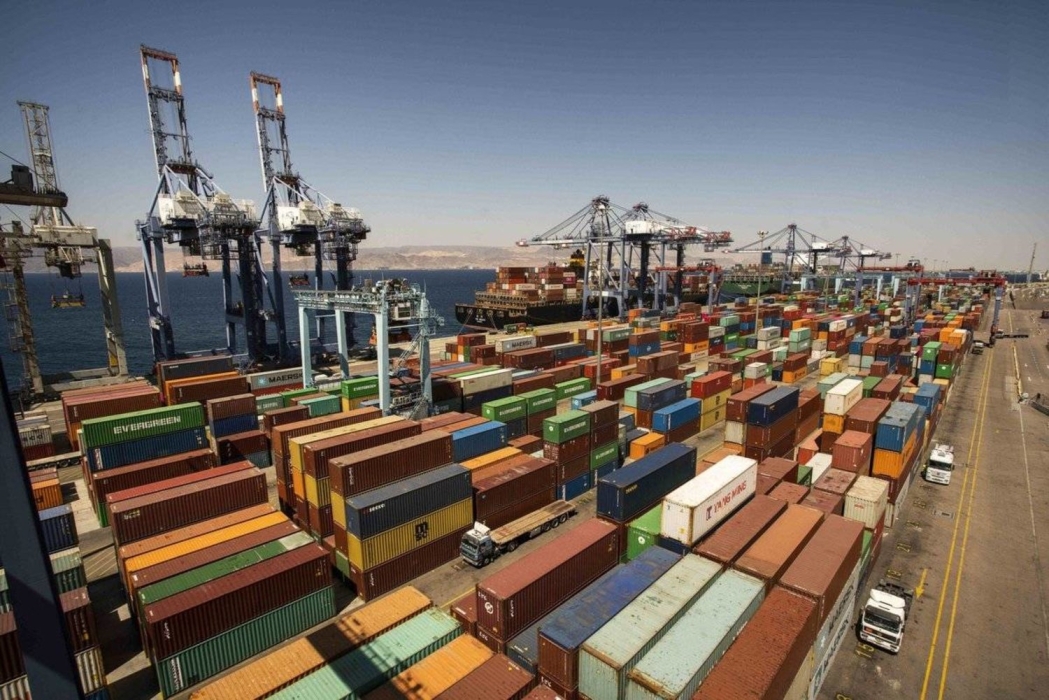- Local News
- Mon-2024-03-18 | 02:10 pm

Nayrouz News Agency : Jordanian exports to Saudi Arabia surged to JD984 million last year, marking a significant increase of 17.1 percent compared to the previous year's figure of JD840 million.
According to data released by the Department of Statistics, Jordan has emerged as a leading exporter to countries within the Greater Arab Free Trade Area, with Saudi Arabia being a key trading partner. Conversely, imports from Saudi Arabia witnessed a decline, dropping by 11.6 percent to JD2.591 billion in 2023, compared to JD2.932 billion in 2022.
The total trade volume between Jordan and Saudi Arabia amounted to approximately JD3.575 billion in the past year, slightly lower than the previous year's figure of JD3.772 billion. Despite the slight decrease in trade volume, Jordan managed to reduce its trade deficit with Saudi Arabia to about JD1.607 billion in 2023, down from JD2.092 billion in 2022.
Khalil Al-Haj Tawfiq, President of the Jordan and Amman Chambers of Commerce, highlighted the promising opportunities for Jordanian businesses in Saudi Arabia. He emphasized the potential for collaboration across various sectors, including information technology, construction, and services. These opportunities align with the economic development initiatives underway in Riyadh and other cities, such as the NEOM project.
Al-Haj Tawfiq announced plans for an official visit to Tabuk following the holy month of Ramadan, aimed at exploring further cooperation and networking opportunities between Aqaba and NEOM. Additionally, meetings will be held on the sidelines of the upcoming Arab Businessmen and Investors Conference in Riyadh, facilitating discussions among prominent economic delegations from both countries.
In a bid to strengthen bilateral ties, Al-Haj Tawfiq revealed plans for the signing of a twinning agreement between major chambers of commerce, including the Riyadh Chamber. This agreement aims to foster knowledge exchange and identify mutual investment prospects between Jordan and Saudi Arabia.
Jordan's exports to Saudi Arabia encompass a diverse range of products, including meat, poultry, coffee, sugar, cocoa, chocolates, and food preparations. Meanwhile, imports from Saudi Arabia predominantly consist of petroleum products, iron rolls, dairy products, dates, corn starch, soybean oil, and various other commodities.
According to data released by the Department of Statistics, Jordan has emerged as a leading exporter to countries within the Greater Arab Free Trade Area, with Saudi Arabia being a key trading partner. Conversely, imports from Saudi Arabia witnessed a decline, dropping by 11.6 percent to JD2.591 billion in 2023, compared to JD2.932 billion in 2022.
The total trade volume between Jordan and Saudi Arabia amounted to approximately JD3.575 billion in the past year, slightly lower than the previous year's figure of JD3.772 billion. Despite the slight decrease in trade volume, Jordan managed to reduce its trade deficit with Saudi Arabia to about JD1.607 billion in 2023, down from JD2.092 billion in 2022.
Khalil Al-Haj Tawfiq, President of the Jordan and Amman Chambers of Commerce, highlighted the promising opportunities for Jordanian businesses in Saudi Arabia. He emphasized the potential for collaboration across various sectors, including information technology, construction, and services. These opportunities align with the economic development initiatives underway in Riyadh and other cities, such as the NEOM project.
Al-Haj Tawfiq announced plans for an official visit to Tabuk following the holy month of Ramadan, aimed at exploring further cooperation and networking opportunities between Aqaba and NEOM. Additionally, meetings will be held on the sidelines of the upcoming Arab Businessmen and Investors Conference in Riyadh, facilitating discussions among prominent economic delegations from both countries.
In a bid to strengthen bilateral ties, Al-Haj Tawfiq revealed plans for the signing of a twinning agreement between major chambers of commerce, including the Riyadh Chamber. This agreement aims to foster knowledge exchange and identify mutual investment prospects between Jordan and Saudi Arabia.
Jordan's exports to Saudi Arabia encompass a diverse range of products, including meat, poultry, coffee, sugar, cocoa, chocolates, and food preparations. Meanwhile, imports from Saudi Arabia predominantly consist of petroleum products, iron rolls, dairy products, dates, corn starch, soybean oil, and various other commodities.










